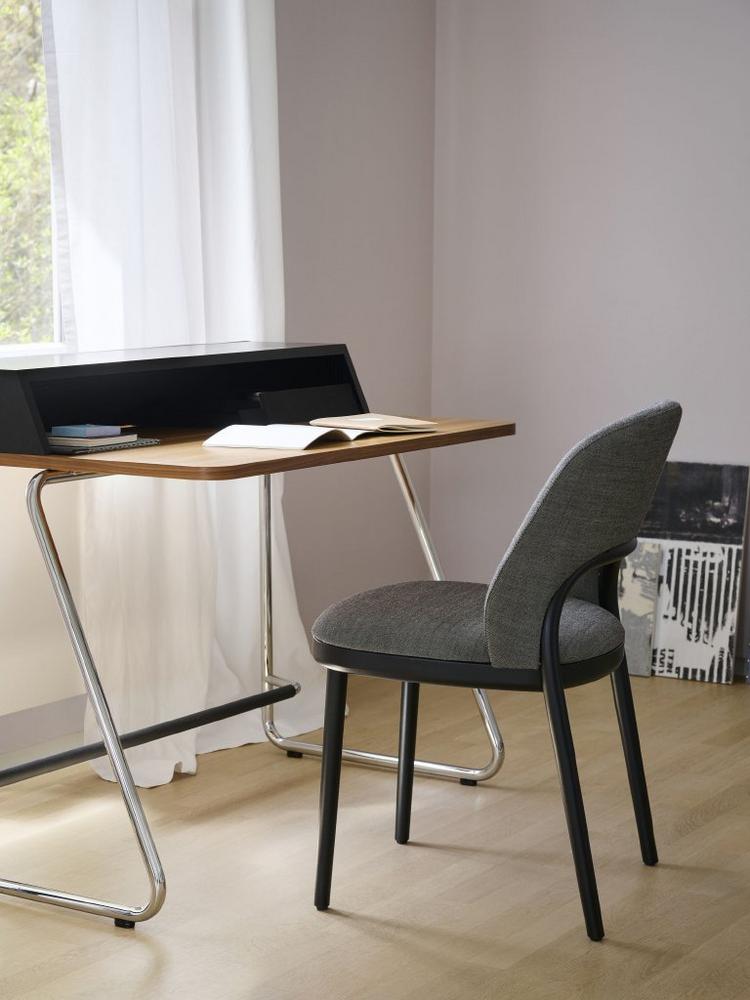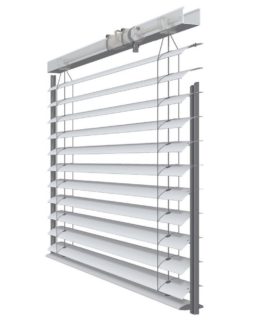
Elegant comfort: the relaunch of the 520 upholstered chair unites classic form with cushioned cosiness
The 520 range of upholstered chairs references Dessí’s personal favourite from the Thonet product portfolio: the bentwood chair 209, a model that many an architect has fallen in love with over the years. “While working on the 520, I studied the Thonet classics. The arc that forms a unit with the back legs is so iconic and so characteristic of Thonet. Our approach is based on that one specific detail.” Inspired by this classic bentwood beech component, Dessí developed a new, complex bentwood element for the 520. “He takes an aesthetic-constructive approach, which can already be seen in the design of the 209,” explains Norbert Ruf, Creative Director of Thonet. “The product’s design is characterised by its open, recognisable construction.”
Marco Dessí has cleverly reduced the space between the lower arc and the seat so it can double as a carry handle, particularly convenient when the chairs need to be moved around. He has designed two options for the chair back of the 520: one with armrests (520 PF) and one without (520 P). The chair is available in a variety of wooden surfaces and cover fabrics, which makes the 520 extremely versatile and allows it to be customised to suit many different settings. The 520’s shape is, in itself, an invitation to take the weight off your feet. “You immediately associate the 520 with comfort, even before you sit down,” says Dessí. “When you do take a seat, the backrest nestles gently against you and, even in the version without armrests, it provides side cushioning and support.” This means optimal comfort in a variety of seated positions, even over many hours.
The innovative process for bending solid wood developed by Michael Thonet in the mid-19th century gave rise to the typical Thonet design language and had a considerable influence on Dessí during his design process: “The fact that the very first Thonet chairs are still in use today demonstrates just how robust, sustainable and utterly contemporary the process is,” he says. For Dessí, the heritage of the tradition-steeped brand is proof “that quality stands the test of time – and that striving for quality can guarantee that a company will be around for 200 years.”
Thonet – future-oriented furniture design with a long tradition
The unique success story of Thonet began with the work of master carpenter Michael Thonet. Ever since he established his first workshop in Boppard on the River Rhine in 1819, the name Thonet has stood for high-quality, innovative and elegant furniture. The breakthrough came with the iconic chair No. 14, today known the world over as the Vienna Coffee House Chair: the pioneering technique of bending solid beechwood enabled the mass production of chairs for the first time. The second milestone in design history was the tubular steel furniture by the famous Bauhaus architects Mart Stam, Ludwig Mies van der Rohe and Marcel Breuer in the 1930s. During those pioneering years, Thonet was the world’s largest producer of these tubular steel furniture designs, which are today considered timeless.
For the company today, the continuous process of innovation is the top priority, together with a focus on tradition and fine craftsmanship. Thonet’s furniture designs originate both from its collaborations with renowned national and international creatives and from the in-house Thonet Design Team. Chief Executive Officer Brian Boyd and Creative Director Norbert Ruf manage the company from the corporate head office and production site in Frankenberg/Eder (Germany). Michael Thonet’s fifth- and sixth-generation descendants are actively involved with the company’s business as partners and sales representatives.
Thonet GmbH
Michael-Thonet-Straße 1
35066 Frankenberg (Eder)
Telefon: +49 (6451) 508-0
Telefax: +49 (6451) 508-108
http://www.thonet.de
QuickStep PR
Telefon: +44 (20) 7609-1151
E-Mail: stephanie@qspr.com
Leitung Marketing und Kommunikation
Telefon: +49 (6451) 508-160
E-Mail: susanne.korn@thonet.de
Telefon: +49 (221) 913949-0
Fax: +49 (221) 913949-19
E-Mail: thonet@neumann-luz.de
![]()




